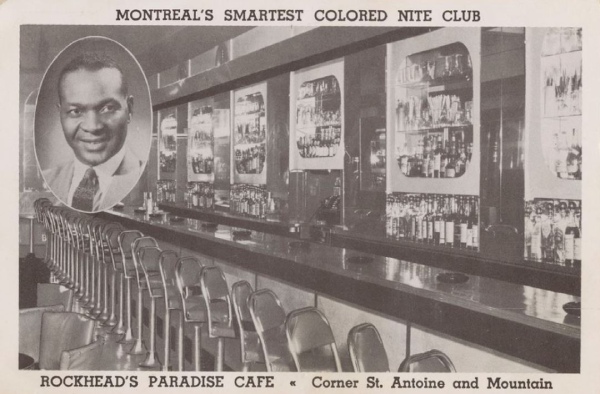Rufus Nathaniel Rockhead National Historic Person (circa 1896–1981)

© Collection Michel Bazinet / Public domain
Rufus Nathaniel Rockhead was designated as a national historic person in 2024.
Historical importance: exceptional individual that left a lasting legacy, served in the First World War, Black entrepreneur, owner of the famous nightclub Rockhead’s Paradise and fosterer of jazz musicians.
Commemorative plaque: no plaque installedFootnote 1
Rufus Nathaniel Rockhead (circa 1896–1981)
After moving from Jamaica to Canada in 1916, Rufus Nathaniel Rockhead served in the First World War, worked as a railway porter, and became an entrepreneur. In 1929, he established Rockhead’s Paradise, a famous Black nightclub in Montréal and the only one owned by a person of African descent at the time when it opened. He fostered the beginnings of Canada’s jazz scene, night life, musical talent, and culture through Rockhead’s Paradise, which operated from 1929 until 1980. He persevered in the face of racism and corruption, provided jobs to members of the Black community, and created a welcoming space for all. An exceptional individual, he left a lasting legacy for African Canadians, Montréalers, and jazz fans.
Rockhead was born around 1896 in Maroon Town, Jamaica. In 1916, he sailed to Canada and settled in Montréal, where he worked at a munitions factory. In 1918, he joined the Canadian Expeditionary Force and served with the Canadian Forestry Corps in France until honourably discharged in March 1919. For his service, he received the British War Medal and Victory Medal. Back in Montréal, Rockhead worked as a porter with the Canadian Pacific Railway until 1927, when he set up a shoeshine and hat cleaning business in Verdun. The same year, he married Elizabeth “Birdie” Weeks, with whom he would have three children.
In 1928, Rockhead purchased the Mountain Hotel at the corner of Mountain (today de la Montagne) and Saint-Antoine streets in the St. Antoine district of Montréal, where much of the Black community lived and worked. The three-storey building had a tavern and lunch counter on the first floor, a dining room and nightclub on the second, and a hotel on the third. The second-floor nightclub became known as Rockhead’s Paradise.

© Concordia University Library / Special Collections and Archives / P0004-02-35
Rockhead’s Paradise quickly became a must-visit venue for locals and tourists alike. Rockhead capitalized on the growing demand across North America for jazz music and cabarets, and on Montréal’s status as a city that permitted the sale of alcohol during the era of prohibition. Unlike other venues at the time, he welcomed all patrons and performers. Throughout the club’s existence famous musicians like Oscar Peterson, Oliver Jones, Harold “Steep” Wade, and brothers Hugh, George, and Milton Sealey informally apprenticed or performed at Rockhead’s Paradise. His nightclub provided a crucial space where Black musicians could hone their skills through practice and performance with talented jazz artists from Montréal, the rest of Canada, and abroad. Visited by international legends such as Louis Armstrong, Cab Calloway, Ella Fitzgerald, and Billie Holiday, Rockhead’s Paradise helped make Montréal an important stop on the jazz circuit.
An affable, charismatic host, Rockhead personally greeted patrons at the door every night. He became a prominent and respected member of the Black community, whose interests he deeply cared about. Twice, he almost lost his liquor licence due to racially discriminatory practices and he was forced to close from 1953 to 1960. As his health declined, he transferred ownership to his son, Kenneth, who sold the club in 1980. Rufus Rockhead died in Montréal in 1981.
“WWI veteran Rufus Rockhead’s pioneering entrepreneurial spirit in founding Rockhead’s Paradise significantly advanced Canada’s Jazz scene and fostered cultural integration. I am delighted that a young student shall include his remarkable story as part of the "Not Just Numbers" project connected to our Canadian Census. Keeping Rufus’ Legacy alive.”
"It is incredible to have the contributions of Black Canadians highlighted in this positive light as too often Black people are portrayed negatively in the news. Once I read the stories in my research and saw how a fellow Jamaican-Canadian thrived and contributed to the fabric of our being, I had to nominate him and it is heartwarming and inspirational to know that despite extreme hardships, it can be done - Rufus Rockhead - a fellow Yawdee paved the way."
This press backgrounder was prepared at the time of the Ministerial announcement in 2024.
The National Program of Historical Commemoration relies on the participation of Canadians in the identification of places, events and persons of national historic significance. Any member of the public can nominate a topic for consideration by the Historic Sites and Monuments Board of Canada.
- Date modified :